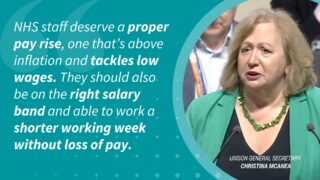The government must drop plans to cap overseas care staff numbers and act to stop employers exploiting those already working in the UK, says UNISON today (Tuesday).
The union says proposals reportedly being drawn up by immigration minister Robert Jenrick to curb migration would be disastrous for adult social care. The draft plans are understood to include a limit on overseas care staff numbers and a ban on them bringing dependants here.
In a new report, Expendable labour, UNISON highlights how care staff are propping up a crumbling care system and calls for the government to end the exploitation they face.
The document calls for a change in visa rules so migrant care staff aren’t deported when care firms collapse and these workers lose their jobs.
The report highlights cases where overseas workers have sold all they own to come here, only for their care employer to close down, lose their council contract or sack staff on baseless grounds.
The report also details harrowing accounts of abusive practices suffered by migrant care staff. The union says the workers have been encouraged to come here to fill staffing gaps in care homes and domiciliary care.
These employees have faced demands for excessive fees from recruitment agents in return for jobs in the UK, had money deducted from wages if they try to leave, and had to pay extortionate rents for substandard accommodation.
UNISON has also uncovered evidence of migrant care staff forced to work shifts lasting 19 hours without breaks, who have experienced racial abuse, and been threatened with dismissal and deportation.
Cases highlighted in the report Expendable labour include:
- A recruitment agent in India asking for £12,000 to ‘introduce’ a care worker to a UK employer.
- A care employer demanding £4,000 for ‘training costs’ when the employee tried to leave for an NHS job, and then with holding their work reference.
- Migrant workers invoiced for administration costs including £65-an-hour fee for meeting them at the airport and £395 for a ‘cultural induction’.
- Companies passing on Home Office charges to staff that employers should be paying themselves, such as the immigration skills charge.
The report says many care workers are being lured to the UK and then given no choice but to accept poor working conditions when they get here.
Current immigration rules make it hard for care staff to leave a job unless they can find a new sponsor.
Skilled overseas workers, which include care staff, currently have 60 days to find a new employer and sponsor. The union says this is not long enough and is calling for a change in visa rules. A visa extension would allow overseas care workers more time to find new employment, says UNISON.
This will prevent employers threatening deportation if staff try to leave their jobs, says UNISON.
In addition, the union wants immigration rules to change so that migrant care workers will only have to pay once for a work visa, and not every time they get a new job.
Other recommendations outlined in the report include that ministers should provide councils with new guidance on how to tackle unscrupulous care employers.
UNISON says cash-strapped local authorities should get help from the government to intervene. This should be in the form of a dedicated fund to enable them to clamp down on abuse.
UNISON also says recruitment of care staff overseas should only take place via agencies on the ethical recruiters list run by the NHS. A national care service would ensure that care staff were paid properly, the union added.
UNISON general secretary Christina McAnea said: “The care system would implode without migrant care staff. Demonising these workers will do nothing to solve the social care crisis.
“Overseas care workers have been encouraged to come here to support those most in need, only for some employers to treat them as expendable labour. Ministers must stop being complicit in allowing this abuse to happen.
“The government needs to reform immigration rules, not make them more draconian. Minister’s attention would be far better focused on fixing care and boosting pay so careers in the sector are more attractive.
“It’s time to stop scapegoating migrants and instead give councils greater funding to tackle those exploiting them.”









